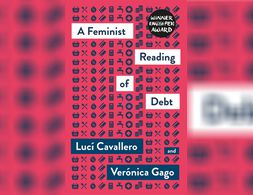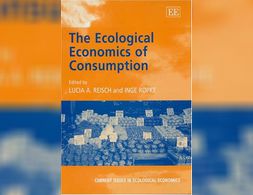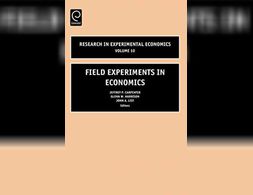✕
413 results
Thomas Piketty's Capital in the Twenty-First Century is the most widely discussed work of economics in recent history, selling millions of copies in dozens of languages. But are its analyses of inequality and economic growth on target? Where should researchers go from here in exploring the ideas Piketty pushed to the forefront of global conversation? A cast of economists and other social scientists tackle these questions in dialogue with Piketty, in what is sure to be a much-debated book in its own right.
In this sharp intervention, authors Lucí Cavallero and Verónica Gago defiantly develop a feminist understanding of debt, showing its impact on women and members of the LGBTQ+ community and examining the relationship between debt and social reproduction.
Research on consumption from an environmental perspective has exploded since the late 1990s. This important new volume cuts across disciplines to present the latest research in the field. The book is divided into three parts, the first of which addresses the problems of consumption both as a concept and as an economic and social force with high environmental impact.
This course will expose students to some of the key debates that link digital transformations to economic, social, and political inequalities. Students will be familiarised with a variety of theoretical movements in development studies and internet studies: exploring thinking that frames the internet as a leveller that can bridge divides vs. exploring the internet as an infrastructure that amplifies existing inequalities.
"This eleven-week course offers a pluralist introduction to political economy and economics. We will examine nine (9) competing schools of thought, each of which offer an original and distinctive illumination of economic and social reality. The course offers a level of learning that would at least match that which is offered by a University. However, you do not need to be connected to a university or to have studied political economy or economics previously to enrol in this particular subject."
In this video, Clara Mattei investigates the function of austerity in relation the stabilization of capitalism as a form of social order build around private property, wage labor and class relations. In order to develop this argument, she situates austerity in the history of World War 1 and its revolutionary aftermath. Zooming in on the politicization of the economy and the associated threat to class society that emerged in the period, she highlights how austerity was a „tool of reaction“ that was successful in curtailing demands for economic democracy and a society free from class oppression.
Economics should schematically explain the key elements and main strands of this core part of social life: the actual workings of our economies. This book argues that orthodox, modern neoclassical economics does not fulfil this core task. Standard economics models do not address the real functioning of our market economies, but rather an imagined economy.
Our public services are in dire need of investment. But in the middle of a debate over competing spending plans, isn’t it also time to ask what we want our public services to actually do for us? That’s the view of group of economists and campaigners who are pushing for something called ‘Universal Basic Services’ – a radical expansion of high-quality public services for all to areas like transport, childcare and social care.
The Routledge Handbook of Feminist Economics presents a comprehensive overview of the contributions of feminist economics to the discipline of economics and beyond. Each chapter situates the topic within the history of the field, reflects upon current debates, and looks forward to identify cutting-edge research. Consistent with feminist economics' goal of strong objectivity, this Handbook compiles contributions from different traditions in feminist economics (including but not limited to Marxian political economy, institutionalist economics, ecological economics and neoclassical economics) and from different disciplines (such as economics, philosophy and political science). The Handbook delineates the social provisioning methodology and highlights its insights for the development of feminist economics. The contributors are a diverse mix of established and rising scholars of feminist economics from around the globe who skilfully frame the current state and future direction of feminist economic scholarship. This carefully crafted volume will be an essential resource for researchers and instructors of feminist economics.
How exactly are persisting social inequalities and the operations of modern finance connected? Adam Tooze provides a detailed answer to a still relevant problem by focusing on the Great Financial Crisis and the role of the finance industry in the USA.
This is an important contribution that defends the importance of heterodox economics. It discusses what constitutes heterodox economics as an intellectual, social, and political project, with a range of contributions from leading heterodox thinkers coming from a diversity of theoretical vantage points.
Is inflation just a number game or does it hold deeper societal implications? Join Isabella Weber (@UMass.Amherst) as she challenges traditional economic stances on inflation and delves into the social dimensions of pricing. Discover how context shapes our reactions to price hikes and why understanding this can be a game-changer.
In this overview paper, Laura Porak reviews the history of industrial policy in the European Union before the background of a Cultural Political Economy approach.
This chapter discusses the role of gender in economic relations, processes, and outcomes. Gender differences in economic outcomes such as labor force participation and wages have received growing attention from economists in the last several decades – a positive and much needed development in economic thinking.
The article pursues the two related questions of how economists pretend to know and why they want to know at all. It is argued that both the economic form of knowledge and the motivation of knowing have undergone a fundamental change during the course of the 20th century. The knowledge of important contemporary economic textbooks has little in common with an objective, decidedly scientifically motivated knowledge. Rather, their contents and forms follow a productive end, aiming at the subjectivity of their readers.
What are the implications of the politics of "behavioural change"? Alexander Feldmann took a closer look for you on nudging and framing and if this is a legitimate instrument being used by the state to make us behave better in terms of our carbon footprint.
Experimental economists are leaving the reservation. They are recruiting subjects in the field rather than in the classroom, using field goods rather than induced valuations, and using field context rather than abstract terminology in instructions.
This course will survey contemporary heterodox approaches to economic research, both from a microeconomic and a macroeconomic perspective. Topics will be treated from a general, critical, and mathematical standpoint.
This book is intended as a textbook for a course in behavioural economics for advanced undergraduate and graduate students who have already learned basic economics. The book will also be useful for introducing behavioural economics to researchers. Unlike some general audience books that discuss behavioural economics, this book does not take the position of negating traditional economics completely.
Exploring Economics, an open-access e-learning platform, giving you the opportunity to discover & study a variety of economic theories, topics, and methods.
Approaching the law of nature that determines all forms of economy. The bulk of economic theory addresses the economic process by setting out on a catalogue of aspects, seeking the laws in the aspects and hoping to get together a reliable view of the whole.
Economic sociology is an entire subfield and one could write an series on it, so I’m going to stick to probably the most prominent economic sociologist and the founder of ‘new economic sociology’, Mark Granovetter.
This course provides future change makers in public and private sectors with a comprehensive overview on the structures and actors that shape markets.
What’s inflation? Why is it relevant? And is there an agreed theory about its roots and causes, or is it a contentious concept? That’s what this text is all about: We define what inflation actually means before we delve into the theoretical debate with an interdisciplinary and pluralist approach: What gives rise to it, what factors might influence it, and, consequently, what might be done about it?
In this essay, the principle of capital accumulation, as well as the idea of homo economicus as the basis of the growth model, are located and analyzed from a feminist perspective. The sufficiency approach is presented as an alternative to these two economic logics.
From the two premises that (1) economies are complex systems and (2) the accumulation of knowledge about reality is desirable, I derive the conclusion that pluralism with regard to economic research programs is a more viable position to hold than monism. To substantiate this claim an epistemological framework of how scholars study their objects of inquiry and relate their models to reality is discussed. Furthermore, it is argued that given the current institutions of our scientific system, economics self-organizes towards a state of scientific unity. Since such a state is epistemologically inferior to a state of plurality, critical intervention is desirable.
This paper starts with an evaluation of three common arguments against pluralism in economics: (1) the claim that economics is already pluralist, (2) the argument that if there was the need for greater plurality, it would emerge on its own, and (3) the assertion that pluralism means ‘anything goes’ and is thus unscientific. Pluralist responses to all three arguments are summarized. The third argument is identified to relate to a greater challenge for pluralism: an epistemological trade-off between diversity and consensus that suggests moving from a discussion about ‘pros’ and ‘cons’ towards a discussion about the adequate degree of plurality. We instantiate the trade-off by showing how it originates from two main challenges: the need to derive adequate quality criteria for a pluralist economics, and the necessity to propose strategies that ensure the communication across different research programs. The paper concludes with some strategies to meet these challenges.
The outbreak of COVID-19 has substantially accelerated the digitalization of the economy. Yet, this unprecedented growth of digital technology brought novel challenges to the labour market. Rise in income inequalities and precarious working conditions or polarization of jobs. In this essay, we try to assess what tools to use to counter these trends.
Complexity economics focuses on interactions and interdependencies between individuals and structures in economic systems. Those are systems of organised complexity. High importance is given to the analysis of networks.
This essay suggests to bring together two aspects of economic thought which so far have developed largely separately: degrowth and feminist economics. In this strive, the concept of care work and its role in feminist economics will be introduced and the downsides of the commodification of care work will be discussed. Subsequently, contributions to the discussion on the (re)valuation of care work will be taken into account.
Dependency in Central and Eastern Europe - Self-reliance and the need to move beyond economic growth
In this essay, the author takes a critical perspective on the pursuit of growth as the solution for providing for environmental sustainability and economic stability in the countries of Central and Eastern Europe.
Drawing from the framework of dependency theory and presenting brief insights into European core-periphery relations the author then argues for the implementation of an alternative strategy to development that is built around the concept of self-reliance.
As seen with the United Nations significant promotion of the Sustainable Development Goals (SDGs) in the past few years, the issue of global development is of growing concern to many international organizations. As humanity continues to become more interconnected through globalization, the inequalities and injustices experienced by inhabitants of impacted countries becomes increasingly clear. While this issue can be observed in the papers of different types (e.g., different schools of thought) of economists throughout the world, the work of behavioral and complexity economists offer a unique, collaborative perspective on how to frame decisions for individuals in a way that can positively reverberate throughout society and throughout time.
We use cookies on our website. Click on Accept to help us to make Exploring Economics constantly better!






























